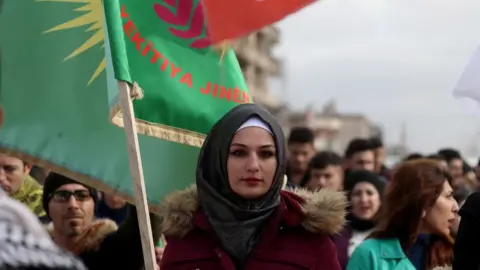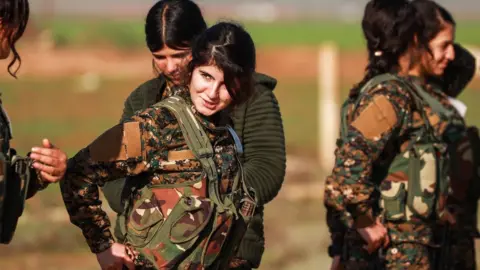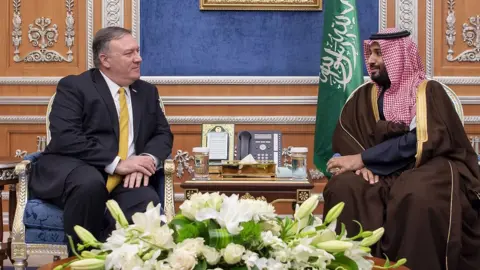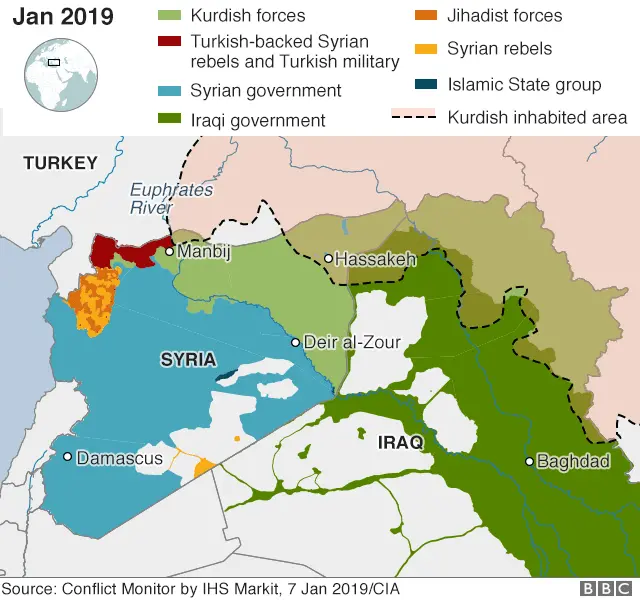Turkey dismisses Trump threat to economy over Syrian Kurds
 AFP
AFPTurkey has dismissed President Donald Trump's threat to "devastate" its economy if it attacks Kurdish forces in Syria after a pullout of US troops.
"You cannot get anywhere by threatening Turkey economically," Foreign Minister Mevlut Cavusoglu said.
US forces and the Kurdish People's Protection Units (YPG) have fought in northern Syria against Islamic State. Turkey regards the YPG as terrorists.
Mr Trump and Turkey's president again discussed Syria on Monday.
In a phone call, Mr Trump and Recep Tayyip Erdogan spoke about the need to create a "security zone" in northern Syria, the Turkish presidency said.
President Trump stressed that Turkey should not "mistreat the Kurds and other Syrian Democratic Forces with whom we have fought to defeat" IS, the White House said.
Mr Trump also "expressed the desire to work together to address Turkey's security concerns" in north-eastern Syria.
In December, the US president announced that Washington would pull out all troops from Syria because the Islamic State militant group had been "defeated".
The sudden move shocked allies and led to criticism. Several senior US military officials resigned shortly afterwards.
There were also fears that Kurds in the Syrian Democratic Forces (SDF), which had partnered with the US, would be attacked by Turkey once the US withdrew.
What was Mr Trump's threat?
Mr Trump tweeted on Sunday that the withdrawal from Syria had begun, and that the US would "devastate Turkey economically if they hit the Kurds".
He also said any remaining IS fighters could be attacked from the air, and that a 20-mile (32km) "safe zone" could be established.
Allow X content?

Allow X content?

His tweet could be seen as a response to criticism that his decision to withdraw troops will hurt the US's regional allies.
Mr Trump offered no specifics on how the US could hurt Turkey's economy, and his announcement appeared to catch his advisers by surprise.
Secretary of State Mike Pompeo, who is currently touring the Middle East, responded to questions about Mr Trump's threat with: "You'll have to ask the president... We have applied economic sanctions in many places, I assume he is speaking about those kinds of things."
Meanwhile, Turkey's foreign minister Mevlut Cavusoglu described Mr Trump's tweet as a "domestic policy message" to critics.
Can the US actually hurt Turkey's economy?
Mr Cavusoglu has rejected Mr Trump's threats, saying: "We have said multiple times that we will not fear or be deterred by any threat."
He also criticised Mr Trump's methods, saying: "Strategic alliances should not be discussed over Twitter or social media."
However, US sanctions have had an impact on Turkey's economy before.
The Trump administration imposed sanctions and trade tariffs in August, amid a row over a detained US pastor - contributing to a sharp drop in the value of the Turkish lira. Pastor Andrew Brunson was released in October.
Meanwhile, Turkish President Recep Tayyip Erdogan's spokesman, Ibrahim Kalin, said Turkey expected the US to "honour our strategic partnership".
"Terrorists can't be your partners and allies," he said.
Will they strike a deal to protect Kurdish fighters in Syria?
 AFP
AFPOver the weekend, before Mr Trump's latest tweets, Mr Pompeo said he had spoken to Mr Cavusoglu by phone and was "optimistic" that an agreement could be reached with Turkey to protect Kurdish fighters.
Mr Pompeo said the US recognised "the Turkish people's right and Mr Erdogan's right to defend their country from terrorists".
"We also know that those fighting alongside us for all this time deserve to be protected as well," he added.
Mr Erdogan has spoken angrily about American support for the Kurdish YPG militia, and vowed to crush it.
Mr Cavusoglu said Turkey was "not against" the idea of a secure zone - but was targeting "a terrorist organisation trying to divide Syria".
How is Mike Pompeo's Middle East tour going?
Mr Pompeo is now in Riyadh, where he discussed Iran and the conflicts in Yemen and Syria with the Saudi leadership.
 EPA
EPAHe said he also raised human rights issues, including the detention of women's rights activists, and the murder of Saudi journalist Jamal Khashoggi in the Saudi consulate in Turkey.
Mr Pompeo said King Salman and Crown Prince Mohammed bin Salman had both "reiterated their commitment" to holding the killers of Mr Khashoggi accountable.
Prosecutors say Mr Khashoggi, a US-based critic of the Saudi government, was murdered in a "rogue" operation in Istanbul, by agents sent to persuade him to return to the kingdom.
However, many in the West have accused the crown prince of ordering the killing - something he has denied.
How many US troops are in Syria?
About 2,000 US military personnel are reported to be deployed in northern Syria.
Ground troops first arrived in autumn 2015 when then-President Barack Obama sent in a small number of special forces to train and advise YPG fighters.
The US did this after several attempts at training and arming Syrian Arab rebel groups to battle IS militants descended into chaos.
Over the intervening years, the number of US troops in Syria has increased, and a network of bases and airfields has been established in an arc across the north-eastern part of the country.


